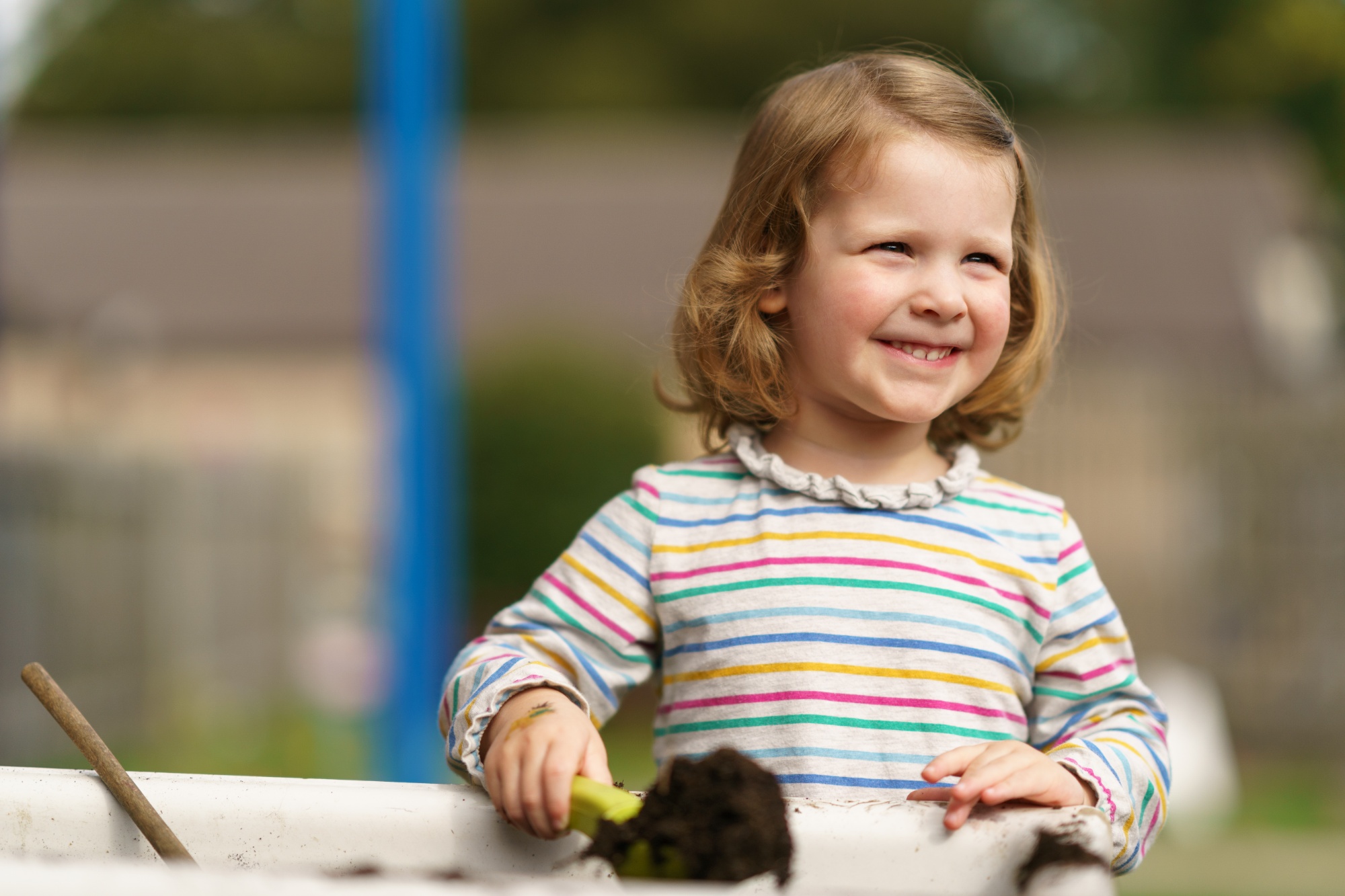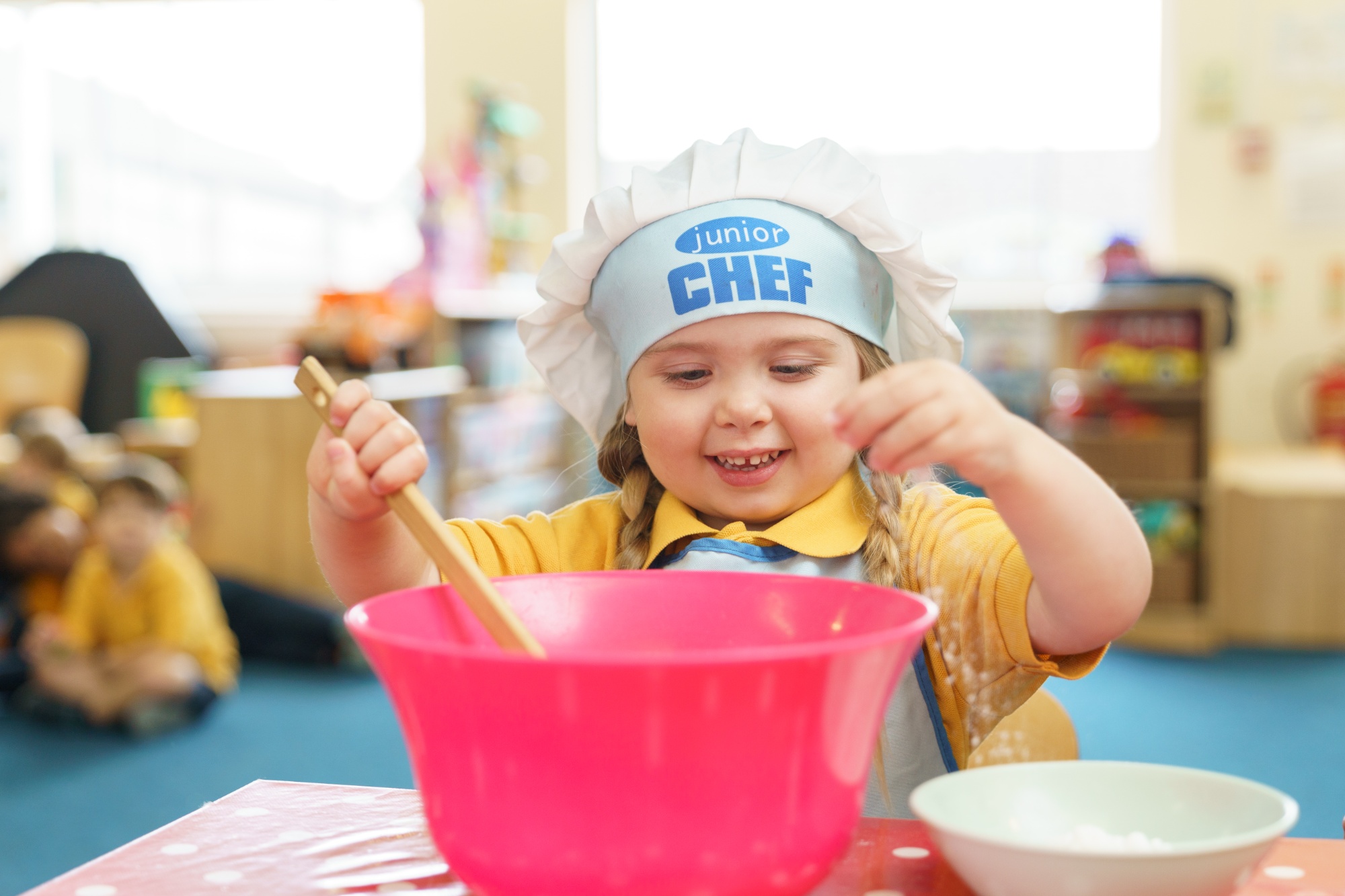Nursery Vision, Ethos, Pedagogy and Top Level Curriculum
St Gabriel’s Nursery Vision and Ethos
- Children are cared for in a healthy, safe, happy, nurturing and stimulating environment where they grow and thrive.
- St Gabriel’s Nursery offers a warm, positive, enjoyable atmosphere.
- St Gabriel’s Nursery provides a stimulating range of experiences in order to maximise the potential of every child for them to make sustained progress.
- Each individual is valued and we recognise that all children are unique.
- We deliver success through positive partnerships and nurture confident, caring and curious children.
- Our children enter Reception ready to learn and become well-adjusted members of society.
Pedagogy
At St Gabriel’s Nursery, we believe that a strong pedagogical approach should support children to experience an early level curriculum for excellence. Pedagogy is about the interactions and experiences which support the curriculum and the process of how children learn. This is inseparable from what young children should learn – the content of the curriculum.
It is crucial that development and learning starts with a focus on children’s well-being and building strong positive relationships and attachments (Maslow and Bowlby).We recognise, that what children need most, is love and care from a responsive Key Person who recognises each child's changing needs and alters their interactions to suit and strengthen children's educational success. Well-being and personal and social development is at the heart of all we do. We consider ourselves not just child centred, but family centred.
At St Gabriel’s Nursery we are passionate about 'learning by doing' (John Dewey). We give children the time and space to explore, discover and use their imagination both indoors and outdoors in a language-rich environment supported by our caring and highly skilled practitioners.
St Gabriel’s Nursery recognises that children learn best through play. We understand that what children learn is important, but for us how children learn comes first; both in terms of our planning and our approach. It is therefore through play that we support children to build their confidence and independence. Through our interactions and planning we empower children to choose, reason, reflect, imagine and empathise thus embedding the characteristics for effective learning both now and for the future.
Adults do not plan ahead, instead we remain ‘in the moment’ with the children as they explore and learn. In play, there is a point when children can be supported, often by an adult (sometimes by another child) to extend their thinking and learning (Vygotsky/Bruner). We call this a "teachable moment". It may come during a moment of sustained shared thinking; the Key Person sees an opportunity to help them extend their idea or achieving a new milestone. The child’s Key Person may have known this moment was imminent or it may be a pleasant surprise. Either way, they have the skills and the resources to support their child through this new experience and will use it to inform future opportunities for learning (a child's "Next Steps"). It is important for all staff to be reflective in their practice and to regularly receive Continuous Professional Development in order to provide the resources, experiences, knowledge, skills and opportunities the children need to grow and thrive.
We offer 'free flow' learning where children can choose to learn outdoors or indoors for most of the day. The environment is continually evaluated and adapted to meet the children’s developmental needs and interests. We believe in a resource rich environment to enable the children to learn, extend and master their skills whilst exploring the awe and wonder of the world.
Parents are an essential part of each child's learning journey. St Gabriel’s Nursery keeps parents up to date about their child’s development and encourages them to do the same. Our online leaning journals are used to log children's moments, observations, photographs and some assessments. Parents can access these on a desktop computer, or mobile device via an app. We welcome parents adding to these, in order for us to work in partnership and support the children’s development.
At St Gabriel’s Nursery we are proud of our approach to children's learning and we continue to inform and challenge ourselves, as educators, to make sure that our pedagogy is informed by research and the curriculum is exciting, engaging and relevant.
Curriculum
The 7 areas of learning and development within the EYFS are:
- Communication and language
- Physical development
- Personal, social and emotional development
- Literacy
- Mathematics
- Understanding the world
- Expressive arts and design
The prime areas of learning form the essential foundations for healthy development and future learning. Once a solid start has formed within the prime areas we continue to build upon these skills, opening to explore more learning opportunities within the specific areas of learning.
These 7 areas are the basis for our curriculum. Careful thought is given to inform our enabling environments (indoors and outdoors), to provide resources, activities and learning opportunities to meet each child’s unique requirements. Ofsted call this ‘curriculum’. Our curriculum is flexible and responsive following children’s interests and those totally unplanned learning opportunities that sometimes come out of the blue, such as it unexpectedly snowing, etc! Our curriculum is supported by high quality continuous provision. Communication and language underpins our curriculum. Our curriculum supports our children to question, to explore possibilities and to become confident in communicating with others. As a nursery, we have put together a ‘top level curriculum’ for each room. These are some of the key things we would like all children to be able to achieve by the time they leave each room; there will also be many other skills and achievements that will be mastered.
Young children learn through play and in different ways. A child’s individual learning characteristic will determine the way they respond to both the teaching and learning taking place in the environment. The EYFS refers to the Characteristics of Effective Learning. These are:
Playing and exploring - Children investigate and experience things and ‘have a go’.
Active learning - Children concentrate and keep on trying if they encounter difficulties and enjoy achievements.
Creating and thinking critically - Children have, and develop, their own ideas, make links between ideas and develop strategies for doing things.
Every EYFS provider has their own bespoke curriculum, to support each child’s unique developmental pathway, following their interests and fascinations.
Top Level Curriculum
Baby Room
Communication and Language
- Listen to and understand simple routine moments e.g. wash hands for lunch and then know to go and sit at the table.
- Understand simple instructions e.g. put your hat on your head.
- Use words/put two words together.
Personal, Social and Emotional
- Separate from carer with confidence.
- To use a comforter only at rest times.
- To be able to interact with others using facial expressions, body language and words.
Physical
- Drink from an open cup.
- Use a spoon/fork to feed themselves.
- Be a confident walker.
Toddlers
Communication and Language
- Speak in short simple sentences of around 4/5 words.
- Listen to and understand instructions and can follow them such as ‘can you put the teddy to bed’.
- Listen to short stories and answer simple questions about the pictures such as ‘what is the cat doing’.
Personal, Social and Emotional
- Begin to understand their own emotions and feelings and communicate how they feel.
- Wipe nose and put tissue in the bin.
- Wash both hands using soap and water.
- Confidence to explore a variety of activities and experiences such as messy play.
- Show growing independence such as helping to tidy up or finding their coat.
- To learn to use the toilet and be dry most days.
- Develop an interest in other children and begin to build friendships.
Physical
- Use a knife/spoon and fork to feed themselves.
- Put shoes on and take them off
- To confidently use a variety of tools and materials demonstrating fine motor control.
Pre-School
Communication and language
- Communicate feelings and needs.
- Speak in complete sentences.
- Recall parts of familiar stories.
- Sing a variety of traditional nursery rhymes.
Personal, Social and Emotional
- Wash and dry hands independently.
- Put own coat on and take it off.
- Dress independently.
- Use toilet independently.
- Follow rules/instructions.
- Share and take turns.
- Understand and follow boundaries.
- Understand about healthy eating and the importance of oral health.
- Resolve conflicts themselves.
Physical
- Fasten zip on a coat.
- Cut with scissors.
- Use a pincer grip to mark make, ‘write’ and draw etc.
- Use outdoor equipment safely.
- Throw and catch a ball.
- Becoming confident to ride a balanced bike or pedal a bike.
- To independently self-serve their own meals and drinks.
Literacy
- Write their name and recognise it.
- To demonstrate a love of reading by being able to recall familiar stories and show an interest in a wide variety of literature.
Mathematics
- Understand the basics of 15 in different concepts.
- To understand and use a wide variety of mathematical language such as positional language, shapes, sizes and make comparisons.
Understanding the world
- Value others.
- Interested in cultures and occupations.
- Understand how to care for and look after things that live and grow.
Expressive arts and design
- Use a variety of ways and means to create and express themselves.
- Be involved in imaginative play with others involving own interests or real life experiences.


